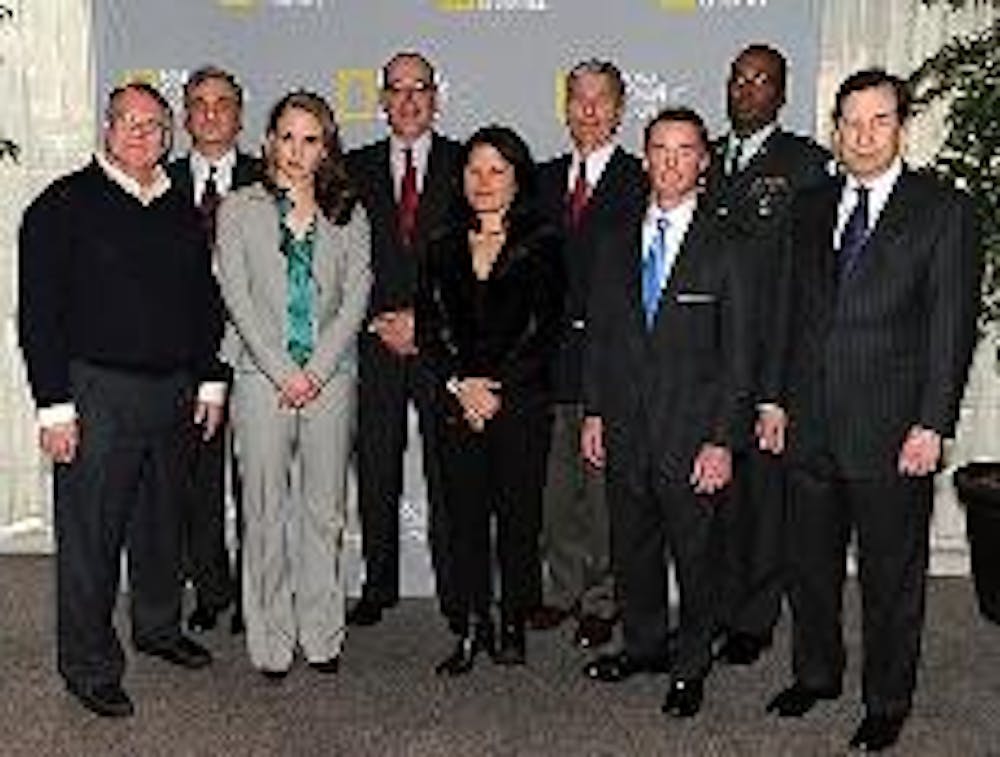The National Geographic Channel held a preview screening Tuesday of the documentary "Explorer: Inside Guantanamo," which followed a diverse discussion panel moderated by "Fox News Sunday" host Chris Wallace, in which panelists contradicted each other on whether torture really occurred at the Guantanamo Bay Naval base.
Bonni Cohen, the film's director and producer and a member of Tuesday's panel, said she spent three weeks with her team filming the documentary at "Gitmo." The documentary made its TV premiere at 9 p.m. Sunday on the National Geographic Channel.
Charles Stimson, former deputy assistant secretary of Defense for Detainee Affairs, said during the panel discussion that the film portrays a very politically balanced view of Guantanamo Bay Detention Camp.
"So I say, mission accomplished in the film," he said.
The filming process complicated her opinions on the issue, Cohen said.
"I had very specific ideas on Guantanamo ... I'm a documentary filmmaker from [San Francisco]. I certainly have my own political leanings," Cohen said in an interview after the screening. "You read the mainstream press. All the iconic images come up. You imagine [Guantanamo] is a dark, dark place where law does not rule ... After three weeks of filming, I don't know anymore."
The film addresses issues concerning Guantanamo, including the disputed presence of torture there.
Sarah Havens, a New York attorney who represents 10 Guantanamo prisoners from Yemen, said "in those prisons I think abuse was ... widespread."
Col. Donald Woolfolk, Guantanamo's former deputy commander and supervising interrogator, said during the panel that no detainees were harmed in the interrogation process.
"During an interrogation process, you're trying to develop a rapport with the detainee to get information," he said. "If [soldiers] rough these guys up, they tear down that effort."
Master Sgt. William Jones, who used that name as a pseudonym, said in an interview that his biggest struggle is keeping the soldiers calm and professional.
"I have to look them in the eye after having being degraded and yelled at by the detainees and tell them that it is all for the mission," he said. "It's a different mission, very complex ... You're dealing with the detainees and the international community and the political community."
All of those issues as well as legal and logistical complications also play into the decision to close Gitmo, according to Stimson.
Mandy Mooney, a graduate student in an interdisciplinary study program in the School of International Service and the School of Communication, said he thinks the legal implications of the release of Guantanamo prisoners are key.
"These people have the right to a trial," she said. "I think that's the biggest issue is allowing the people to voice their opinion about what happened and to be tried in a fair way."
Jessica Leeser, a senior in SOC who has been interning at the National Geographic Channel since September, said she volunteered at the event on Tuesday. Since she was working in the background, she said she did not get to watch the film at the event, but she is excited to see it on Sunday during its first TV broadcast.
"I view [Guantanamo] as a place where suspected terrorists are taken and never fairly prosecuted," Leeser said. "I hope to learn more ... and maybe the film will give me some justification ... and a reason to agree with the decision [to close Guantanamo]."
Panelists debated the Obama administration's recent decision to close Guantanamo.
"While in office, I led the first study on closing Guantanamo," Stimson said.
The prisoner population has been decreasing consistently ever since the base at Guantanamo began its detention of enemy combatants, according to Stimson.
Even if they close the prison at Guantanamo, there are other U.S. military bases, Haven said.
"If the U.S. takes detainees and keeps them somewhere else indefinitely without a charge, Guantanamo still exists as a concept," she said during the discussion.
Michael Raeier, an exchange student from the University of Versailles who is studying at AU for a year, said foreign views of the United States are worse because of Guantanamo.
"That was a blow, when Bush was re-elected," Raeier said. "Everyone was thinking 'he made such a mess,' but everyone still voted for him. Now it's changed a great deal. Obama made it very clear that he would not allow torture and that he would close Guantanamo Bay and that he would protect the Constitution."
The current Guantanamo dilemma stems from mistakes made in the past during the Bush administration, Cohen said during the interview.
"When they had the chance to right some wrongs, they didn't take it," she said. "Now we're living with the legacy. It's not straightforward what to do."
But Cohen's documentary is an attempt to show Guantanamo in a politically balanced way.
"I think it will be a worthwhile documentary, and I'm excited to see that the issue is being addressed in a media that can reach a lot of people," Toomey said.
You can reach this staff writer at news@theeagleonline.com.





